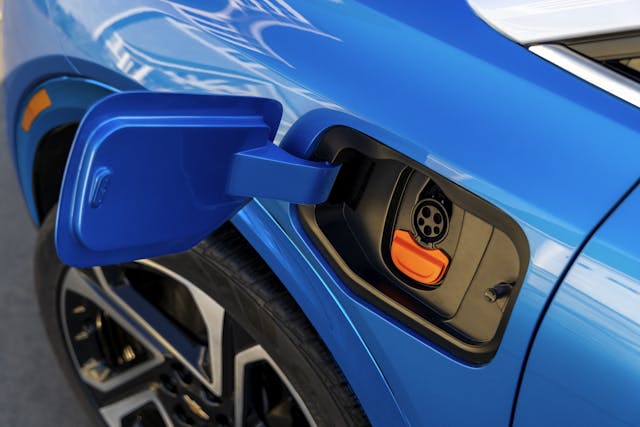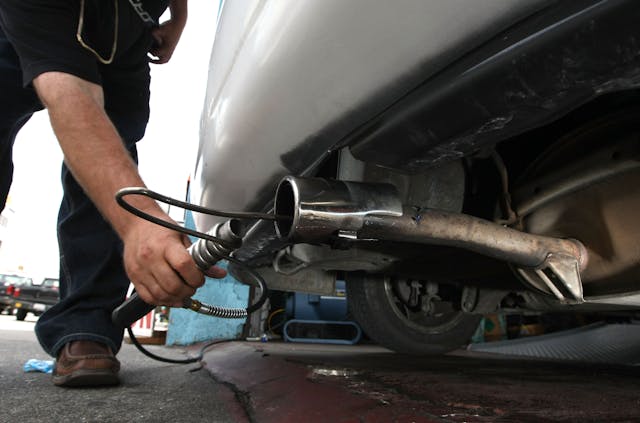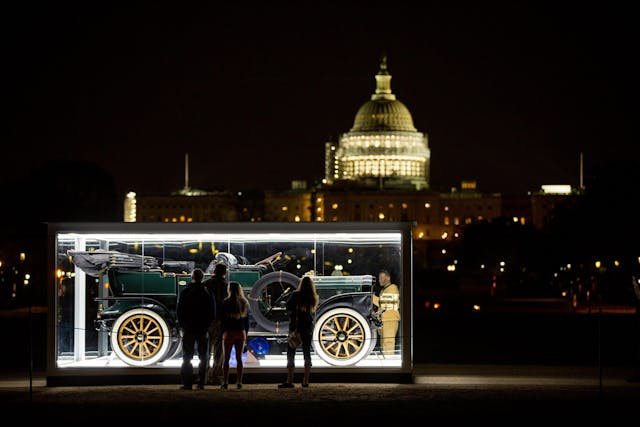U.S. House of Representatives passes anti-EPA CARS Act
The U.S. House of Representatives on Wednesday passed the Choice in Automobile Retail Sales (CARS) Act, legislation that directly targets President Biden’s federal regulations that take aim at petroleum-powered vehicles.
The vote was 221-197, with every Republican and five Democrat members of Congress voting in favor of the CARS Act. The legislation was introduced five months ago in response to tailpipe emissions regulation proposed by the Environmental Protection Agency in April that, the White House claims, could result in 67 percent of new car, SUV and light truck purchases, up to 50 percent of bus and garbage truck purchases, and up to 25 percent of long-haul trucks going electric by 2032.
“The passage of the CARS Act is a massive victory for every consumer and the entire American auto industry,” Representative Tim Walberg (R-Michigan), one of the bill’s sponsors, told Fox News Digital. “Biden’s mandate has always been unrealistic, and a textbook study on how central planning and Bidenomics simply do not work. Mandating EVs has never been a responsible or affordable solution.
“Just last week, nearly 4000 car dealers sent a letter to the Biden administration asking them to reconsider their EV mandate, citing a lack of demand from consumers. Today, with the passage of the CARS Act, the House showed we’re listening,” said Walberg.

If passed into law, the CARS Act would prohibit the EPA from finalizing proposed federal emissions standards for light- and medium-duty vehicles for model years 2027 to 2032. The CARS Act also prevents future EPA emissions regulations that would mandate certain technologies or limit the availability of vehicles based on engine type.
“Thousands of small businesses and their employees will be adversely impacted by this proposal’s overly aggressive push to electrify America’s automotive sector,” said SEMA president and CEO Mike Spagnola. “There are many options on the road to zero emissions. American-grown biofuels, carbon capture and innovations in engine production are all aimed at this shared goal.”
U.S. Senators Mike Crapo (R-Idaho) and Pete Ricketts (R-Nebraska) have introduced a bipartisan companion version of the CARS Act in the Senate. The bill has 33 co-sponsors and awaits consideration in the Senate Environment and Public Works Committee.

Not everyone supports neutering the EPA’s ability to lessen the impact of motor vehicles. “Tailpipe pollution causes tens of thousands of premature deaths nationwide each year, especially in communities of color,” said Chelsea Hodgkins, senior zero emissions vehicle (ZEV) advocate with Public Citizen’s Climate Program. “EPA must uphold its commitment to environmental justice this year by issuing the strongest clean car standards.”
The White House issued a statement saying it “strongly opposes” the CARS act, and if the president is presented with the bill, “he would veto it.”
“We’re grateful to the Biden Administration for opposing this ridiculous attempt by House Republicans to block important climate and clean air safeguards for the American public,” said Sierra Club Legislative Director Melinda Pierce. “Our communities are suffering from poor air quality and worsening climate impacts—pollution from our cars and trucks is a major contributor to both.
“The White House and the EPA rightfully see electrifying vehicles—among other clean transportation priorities like expanding transit and investing in infrastructure for safer streets—as central to tackling the climate crisis and protecting public health. The EPA’s clean car standards can deliver massive benefits to local communities, while saving people money on gas.”
***
Check out the Hagerty Media homepage so you don’t miss a single story, or better yet, bookmark it. To get our best stories delivered right to your inbox, subscribe to our newsletters.



I can drive any of my cars anywhere and not have to worry about the length of refueling because they are ICE powered. It’s about 5 minutes to fill up. An EV it varies on the where and the when for length. Case in point I can drive to Chicago from Austin and spend less time getting there in my cars instead of waiting for a battery system to charge up. EV is not the equal of ICE in terms of convenience and I’m not giving it up.
It’s too bad this vote basically fell on party lines. We can tell which party doesn’t care about your freedom.
You are perfectly free to care not one bit about your children’s and grandchildren’s future.
There is an absolute astounding amount of science behind all of that data. Not media. I would be happy to provide links, however, personally, I think it would benefit you and most anybody to spend some time researching it yourself. Google ahoy. The numbers are supported and not propaganda. Much like wanting your CT scan machine to work, your cancer treatment to be well researched, this is the same type data, just different subject matter. Cheers.
Do you work on your own cars when necessary (or even when not necessary)? Do you also own a fork-lift? A Tesla battery pack reportedly weighs around 1800 lbs! Those on a Nissen Leaf are only(!) about half that poundage. The average do-it-yourselfer is NOT going to swap out his own battery pack when it becomes necessary, so another source of weekend entertainment- working on a beloved car- will be lost.
Sure, we can save money on gas but I find that even on my electric golf carts the price of the batteries FAR EXCEEDS the amount I saved on gas.
I recently had a brief demo drive in an EV sedan (not a Tesla). The car seemed well-built, had decent handling, and was quick, of course. At the end of the drive bit, I asked about long-distance range. We selected Portland (600 plus miles), and the on-board computer determined a recharge would be necessary at about 375 miles where the nearest charge point was a 120v unit that would require hours to fully top up. Ok, not great. I then asked about cost, and she was startled when the computer showed .39 per kWh. Oh, that’s a lot, she said. It’s only about .17 per kWh in Florida where I live. Oops!